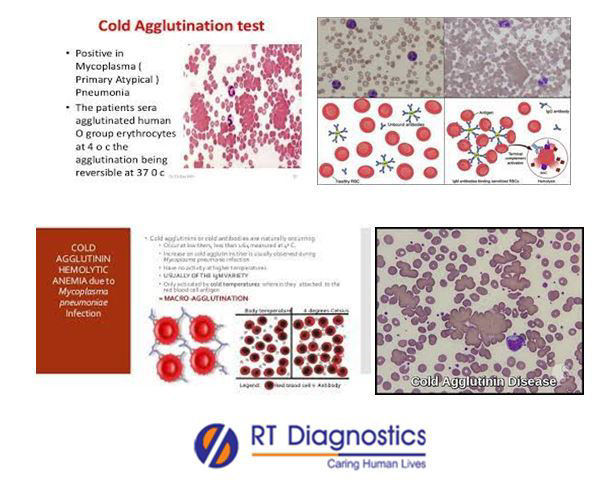Cold Agglutination:
Why Cold agglutination Test?
CLINICAL INFORMATION
Cold agglutination test helps to screen, detect the presence of certain auto-antibodies by the body (in response to some infections) known as cold-agglutinins, which clumps the red blood cells together (agglutinate) at low temperatures. This disease may be classified as a primary or secondary type based on the nature of the cause (triggered by an infection or other conditions such as Raynaud’s disease). Some other diseases or conditions (secondary causes like rubella, trypanosomiasis, malaria, blood dyscraisias, liver diseases) that can trigger cold agglutinin disease are Mycoplasma pneumonia infection, infectious mononucleosis, certain cancers such as lymphoma, leukemia, and multiple myloma, etc, some bacterial infections such as Legionnaires disease and syphilis, certain viral infections such as HIV, influenza, EBV, hepatitis-C, Kaposi sarcoma, etc. Hence cold-agglutinin test measures the levels of cold agglutinins in the patient’s blood. Cold agglutinin test is ordered as a differential diagnostic test to rule out causes for hemolytic anemia and to confirm the cold-agglutinin disease. Causes of Cold-Agglutinin disease may be multi-factorial. Clinical manifestations of cold agglutinin disease include recurrent symptoms that arise when exposed to cold temperatures like acrocyanosis/cyanosis – painful bluish fingers, toes, ears, the tip of the nose, etc, weakness, lack of energy causing fatigue, pallor -pale skin, and/or mottled discoloration of the skin (livedo reticularis), headaches, dizziness, bulging in fingertips and toes and the tip of the ears when exposed to cold temperatures, swollen lymph nodes- lymph adenopathy, dark urine, chest pain, back pain, heart disorders – arrhythmia, murmur, enlarged heart and/or heart failure, splenomegaly, hepatomegaly, vomiting, and diarrhea, etc.
Complications of cold-agglutinin disease if untreated can lead to anemia (hemolytic,) decreased hemoglobin, gangrene, etc.
Other associated tests performed along cold-agglutinin tests are CBC, peripheral blood smear, reticulocyte count, Direct Coombs test, serum protein electrophoresis (immune-fixation by immunoelectrophoresis), etc.

General Instructions:
Sample Requirement: Specimen - Blood sample collected from the vein. Test Preparation: None.
NOTE - Sample for specimen collections may vary based on the patient’s condition/cases according to the patient’s presenting complaints/signs or symptoms:
SPECIMEN REQUIREMENT (Special or Rare Cases) - As instructed and guided by Physician / Clinician / Pathologist / as per Laboratory’s requirements, according to procedures and protocols.
Sample Requirement: Blood Sample taken from the vein
Test Preparation: None
This Multi-Specialty Clinical Referral Laboratory RT DIAGNOSTICS provides precise and accurate tests with an extensive range of testing services to the medical centers to help in the diagnosis and identification of pathology in the test specimens for infectious diseases and also to evaluate the function of organ systems of the patient. It prevents further complications and helps to stabilize and restore health to near normalcy at the earliest without delay.



